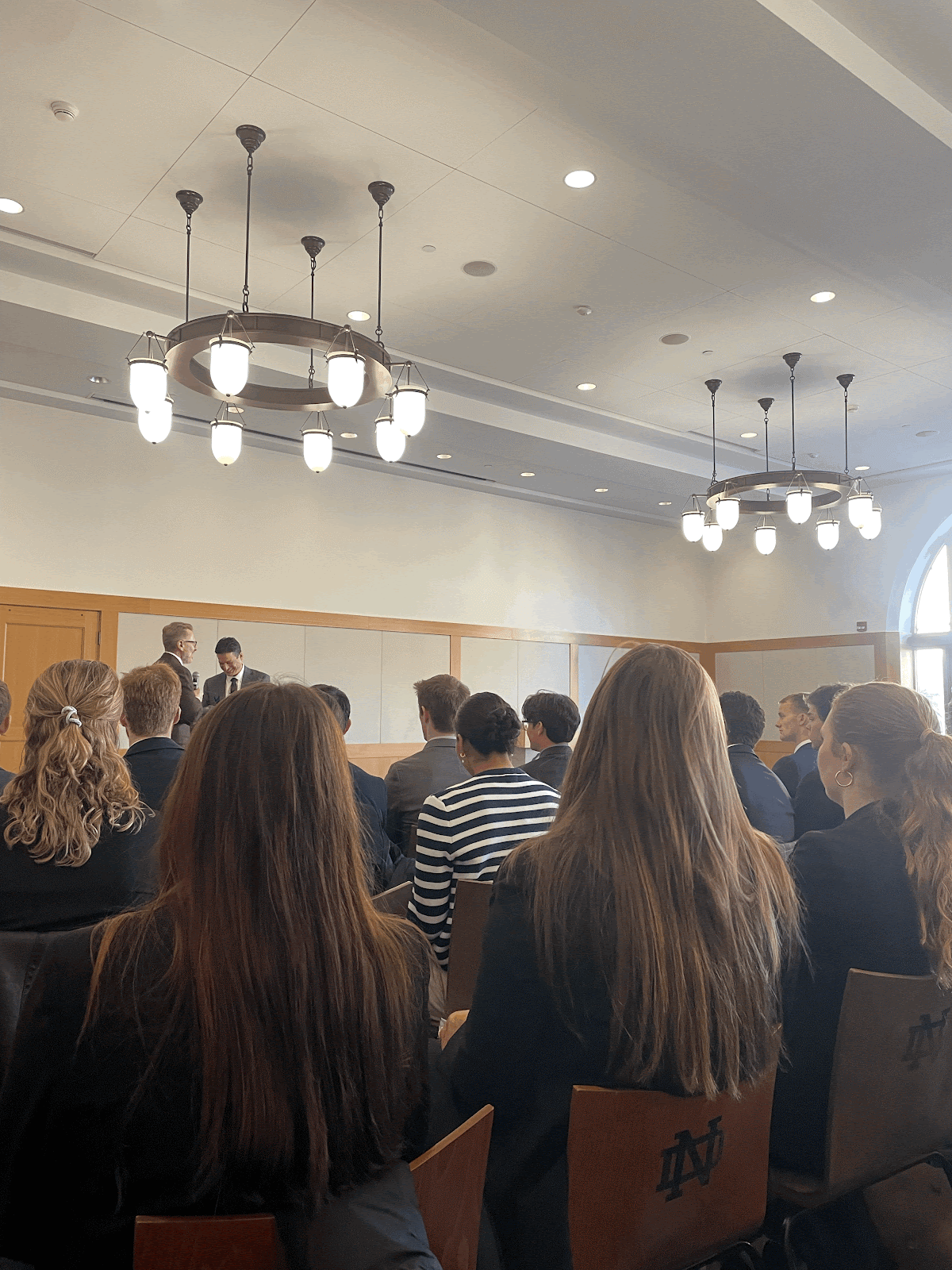On Friday, the Mendoza College of Business hosted the first Dean’s Speaker Series of 2025. The presentation, titled “The Dignity of Human Life in the Digital Age,” featured Paolo Carozza, a law professor at the University of Notre Dame Law School.
The event took place in Stayer Center, Common Room A, and had an audience of about 80 students and faculty. Providing an attendance opportunity for students within the Mendoza College of Business Undergraduate Honors Program, the event's discussion was centered around the relative dangers of technological advancement if human dignity is not upheld and honored in the modern day.
James Otteson, the director of the Mendoza Honors Program, introduced Carozza. Within the introduction, Otteson recognized Carozza as having worked extensively in government and policy efforts, specifically in the context of social media and online platforms. With an undergraduate degree from Harvard College and a multitude of accomplishments in the context of human rights, Carozza was highlighted as an extremely distinguished member of the academic community.
Carozza opened the discussion with an anecdote detailing a boy who seemingly cut off communication with both friends and family in pursuit of an interpersonal relationship with a female artificial intelligence chatbot. As their “relationship” grew stronger, the boy felt it necessary to commit suicide in order to be reunited with his “love” after death. Carozza shared the story as a prelude to his lecture, emphasizing that technological advancements should not replace human connection.
“Humans’ new relationships with technologies can strike at the root of human dignity,” Carozza said.
Looking specifically within the context of religion, Carozza upheld a strong regard for human dignity, regardless of encroaching technological threats.
“Through the Catholic moral tradition and account … dignity and worthiness of each individual is seeing that they are all created in the image of God,” Carozza said.
In his lecture, Carozza outlined a list of three essential aspects of human dignity that need not only be discussed but extensively upheld in order to keep technological advancements as accounts of human aid and not as a means to replace humans at large.
Carozza first mentioned “[the] need to understand better how the meaning and dignity of humanity is embodied.”
With this, he appointed technology as a means to destroy human dignity. Carozza mentioned the daunting fact that Facebook publicly stated they were aware that one in three teen girls were subject to body dysmorphia after using the social media platform, but the company ultimately presented no aspiration to mitigate their impact.
He went on to argue that social media fosters a “connection without meaning.”
Working into the second of three points, Carozza explored the essence of technological advancements threatening the heart of humanity.
“The term ‘heart’ is the locus of desire and where profound intimacy is obtained,” Carozza said.
Seeking to preserve the essence of humanity from being overtaken by technology, Carozza warned the audience that God granted individuals hearts as a means to cultivate life, which should and cannot be extended to technology.
“What meaning do I want to give my experiences? What have I to give to others? How have I done this for God?” Carozza said.
In his third point, Carozza emphasized that algorithms are simultaneously “flushing out the heart” as well as the human capacity to function.
“Technology proves that our thoughts and will are easily predictable, but that is not true to the heart,” Carozza said.
He additionally contended that technology, and specifically artificial intelligence, is based on a numerical system and only has the capacity to replicate relationships, not cultivate them.
“Algorithmically mediated connection to reality sacrifices the dignity and connection of humanity,” Carozza said.
Carozza concluded his third point by classification of “returning to the centrality of human dignity.”
Carozza discussed the fact that a majority of governments have not yet begun exploring artificial intelligence and its implications, let alone creating policy in its regard. In turn, Carozza urged technology creators to be mindful of their inventions' ethical implications.
“Creators need to already start with human dignity at the forefront of their designs,” Carozza said.
Carozza cautioned humanity to remain central to their God-given virtue of dignity and to put connection at the forefront of innovation.
“There is a constructive role in establishing common public values, essentially establishing a northern star to guide our principles,” Carozza said.










